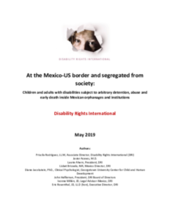Introduction
Disability Rights International (DRI) carried out two investigation trips to Baja California, Mexico, in November 2018 and February 2019. DRI was accompanied by the Human Rights Commission of the Mexican State of Baja California (CEDH) and visited four residential, private institutions for children and adults – including migrants - with disabilities. In these institutions DRI found grave instances of torture and abuse, including use of prolonged restraints and isolation rooms. Particularly worrying was the high death rate of children with disabilities at an institution near Ensenada, Baja California, called Casa Gabriel. According to the information provided by staff, in February 2018 four children with disabilities died within days of each other. The fact that the institution is still operating, one year after the deaths, and that there has been no serious and exhaustive investigation into the deaths, raises serious concerns for the safety of the children detained in Casa Gabriel and in institutions across Baja California.
Two of the four institutions visited by DRI were operating without a license and arbitrarily detained children and adults with disabilities –some of whom were sent by the government. DRI visited a private facility that locked-up minors, adults with drug and alcohol abuse problems and adults with disabilities, all mixed together. The institution had no registration or legal authority to operate. This facility subjected minors and adults to isolation and physical restraints and had no formal treatment program other than prayer and other religious programming. Despite the lack of treatment, people at the facility were tied up for hours and locked in isolation rooms for days at a time when they misbehaved. Mexico must stop private parties from locking up individuals with perceived disabilities without any form of legal authority and forcibly treating them with unproven, experimental programming.
DRI found another unregistered unlicensed institution called Pequeño mundo especial. This institution was operating in a dilapidated house and children and adults with disabilities were detained and mixed together. The government sent children to this institution for months, despite it being unlicensed. When DRI visited it, in November 2018, the government was removing the children because they were mixed with adults, not because the institution had no registration. In fact, according to the director, the children were leaving but the adults with disabilities were going to stay.
Based on our findings, DRI is deeply concerned about the rights of children and adults with disabilities detained in institutions in Baja California. While children and adults with disabilities is the primary population subject to these abuses, unaccompanied minors and persons with disabilities deported or stopped at the US border and returned to Mexico are also at risk. According to the National Migration Institute, around 3,000 unaccompanied migrant minors are deported every year from the United States to Tijuana. DRI met with the Director of the System for the Development of the Family (DIF) for the State of Baja California who stated that 80% of unaccompanied minors are returned immediately to their families. The remaining 20% are reunited with their families within a year –if the family can be identified. For a number of them, their family is never found. DRI expresses its concerns for migrant children for whom the only alternative is to spend months in institutions while their family is found, and who may end up staying in orphanages for years if their families cannot be traced.

